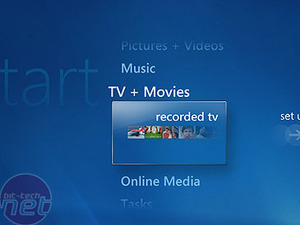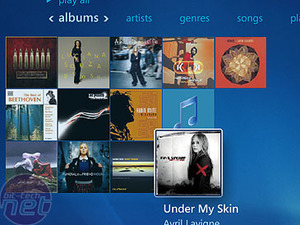
Entertainment
We are living in an increasingly converged world, and the PC is really an entertainment hub today. Whether it's TV, video, photos or music, these kind of activities are what we think of as 'everyday' now. Microsoft has realised this, and brings some new multimedia features to the table.Media Center:
Home Premium and Ultimate both include Media Center as part of the package, and it's accessible from the Start menu. The look and feel is pretty similar to the XP version, although it does appear a little more crowded. Each menu item - TV, Music - has sub-menus accessible on the Home screen, right in your face - making it seem like the different icons are jostling for position. Likewise, the screens for music and photo selection move the icons for choosing how you organise the list to the top, rather than in neat buttons down the side, making the whole thing look far more complex than it ought to.Performance is on par with MCE2005, but the kicker will be reliability, which is yet to be proven. MCE05 was a great piece of software and, aside from lacking a few bits of hardware support, was a great TV OS. What it really screwed up, in almost everyone's experience, was reliability - it would simply bomb out too often, lose channel lists too often, fail to record too often. Our initial experience with Vista MCE suggests that it is better in this regard, but whilst reliability may be a step forwards, we really do think that the interface is a step backwards.
Photo Gallery:
For the bit-tech readers that haven't grasped Flickr yet, Photo Gallery is an application for organising, tagging and slide showing your photos. It's a bit of an iPhoto-a-like, designed to make it easier for you to enjoy your holiday snaps et al. It's certainly better than anything in XP, but it lacks the online sharing functionality to really make it the best bet for casual snappers.Vista and DRM:
There has been a lot of furore across the internets in the past couple of weeks, with much finger-pointing and angry-posting at the DRM features in Windows Vista. The theory goes like this: Evil content companies hobble their new optical discs with DRM. Microsoft implements this DRM in Vista. Microsoft is evil, and Vista is rubbish because of this.In my mind, this is a bad argument. Microsoft is doing its bit to support the kind of content that people are going to want to watch - after all, Windows XP had support for DVDs built in. The next-generation DRM is DVD's CSS, but on the next scale. Is Microsoft responsible for the DRM put into an industry standard disc?
Some commentators have argued that, yes, the company should be. Without PC support, these next-gen DVD formats would perhaps be useless and, since Microsoft owns the PC market, it should be lobbying on behalf of consumers to get these horrendous DRM restrictions (HDCP compliance, for the most part) locked down. Even if it couldn't get that far, why spend all this time implementing DRM when that time could be better spent on security? Why add extra code that could have vulnerabilities in just to please Hollywood?
That's all well and hoopy frood, but the fact is that the market will go one of two ways. Either HD-DVD and Blu-ray will be so unwieldy, so unfriendly that no-one will use them and will flock to alternative methods for getting hold of media - in this case, the consumer (and the anti-DRM lobby) wins. Or, it turns out that people are happy to abide by the DRM restrictions, the majority of PC users end up happy and the anti-DRM lobbyists have to accept that the market says they're wrong. Either way, the only way you can pin this on Microsoft is if you believe that MS has more power than Hollywood when it comes to film distribution, and I don't believe that's the case.
In any respect, unless you use next-gen optical formats in your PC, you're not going to come across DRM that is any more vicious than anything in XP or even OSX. Tilt bits and consequent armageddon scenarios aside, Vista doesn't bring anything to the table that goes beyond support for HD-DVD and Blu-ray. You can still do everything you could and would do under XP, so it hardly seems like a showstopping issue.

MSI MPG Velox 100R Chassis Review
October 14 2021 | 15:04












Want to comment? Please log in.